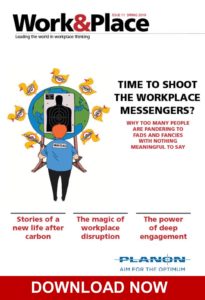- A new report by CBRE reveals that over 900,000 sq ft of flexible workspace was leased during Q1 2018 in Manhattan
- Much of this growth is thanks to WeWork, which is the largest flexible space operator in Manhattan with 45% of market share
- Despite increasing competition and consolidation, CBRE suggests that there are plenty more opportunities for operators to expand their footprint in Manhattan
CBRE’s latest research “Beyond Coworking” takes a look at Manhattan’s flexible workspace market, stating that flexible workspace solutions are now Manhattan’s fastest-growing industry. The research “examines the evolving flexible space landscape and its impact on the Manhattan office market, where flexible workspace operators continue to rapidly lease space.”
Globally speaking, New York City is one of the most expensive and largest flexible workspace markets. According to CBRE, 2017 was the “third consecutive year in which the flexible space sector leased more than one million sq ft. in Manhattan.” Today, the sector occupies 9.2 million square feet, having grown approximately 600% since 2009, with 65 different operators running over 260 workspace locations in Manhattan alone.
Moreover, “the sector has averaged an annual growth rate of 22%. If this rate continues, the footprint of flexible space operators could reach 15 million square feet by the end of 2020, or approximately 4% of Manhattan’s total occupied office space.”
Much of this growth, according to CBRE, can be attributed to WeWork alone. “WeWork is the largest flexible space operator in Manhattan, with 4.1 million sq. ft., or 45% of market share as of Q1 2018 — more than the next 10 operators combined.” And not surprisingly, WeWork continues to grow — in Manhattan and the rest of the world. In Manhattan, the coworking giant “closed five transactions for approximately 562,00 sq ft.,” which makes it the 6th largest occupier in the city.
WeWork isn’t only driving Manhattan’s growth, it’s also driving the city’s average deal size. While most deals average a total of 21,000 square feet among flexible workspace operators, WeWork’s deals average a total of 95,000 square feet.
For its part, International Workplace Group (IWG) accounts for 16% of Manhattan’s market share, operating a total of 48 locations — both Regus and Spaces — which account to 1.52 million square feet. Right behind IWG is Knotel, which was founded a little over 2 years ago, and has experienced exponential growth since. “As of Q1 2018, Knotel had reached 26 locations totaling 570,000 sq ft.,” and having recently raised US$70 million in additional funding, we can only expect for the company to further its growth.
However, with growth comes competition, and operators in Manhattan need to differentiate themselves from the competition and standout in the crowded market. This has led to the rise of niche spaces in Manhattan and elsewhere, and the rise of operators that focus on meeting, conference, and event space — like Convene — as well as other types of specialized spaces.
This increased competition has also led operators to take up leases in more expensive space. CBRE’s research found that “before 2015, few (flexible workspace) deals were signed above $50 per sq ft., but since 2016, the average taking rent has jumped to more than $61.50 per sq ft.” This is worth highlighting as Manhattan’s transactions “have remained relatively flat since 2015.”
And though one would think the Manhattan market is oversaturated, flexible workspace take-up has steadily increased, both by corporate occupiers as well as coworking’s original target audience of startups, small businesses, and entrepreneurs. And CBRE concluded that “there is mounting momentum for flexible space providers to expand their footprint in Manhattan and beyond,” especially as “75% of corporate occupiers anticipate including coworking or flexible space in their occupancy portfolio over the next three years.”
And as the market in Manhattan and beyond continues to grow, it is expected that industry consolidation will happen at a faster rate, especially in markets like NYC where there is an abundance of operators.
Read Full Article from AllWork.Space https://ift.tt/2shbxjg



